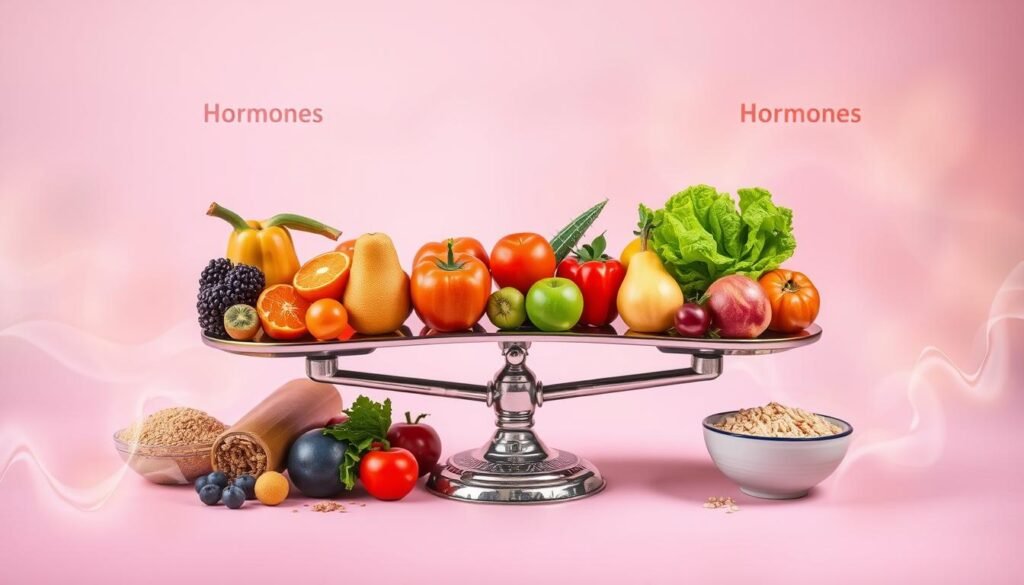It might surprise you, but up to 15% to 18% of women in their childbearing years have polycystic ovary syndrome (PCOS). This makes it a very common hormonal disorder. Knowing about PCOS is key. That’s because managing how many calories you eat can hugely affect your hormones and metabolism if you have PCOS. Insulin resistance and what you eat play big roles. So, it’s very important to manage your weight well if you’re affected.
Let’s look deeper into how counting calories can influence your hormones and metabolism with PCOS. Dietitian Amanda Stathos talks about the goodness of a Mediterranean diet. It’s full of whole grains, lean proteins, and fruits. This can help control symptoms and prevent other health issues. Keeping your weight in check and your blood sugar steady can create a better balance of hormones. This could lower your PCOS risks.
Key Takeaways
- PCOS affects 15% to 18% of women of reproductive age.
- Calorie control is essential for managing insulin resistance and overall hormone regulation.
- Adopting a balanced diet, such as the Mediterranean diet, can improve health outcomes for those with PCOS.
- Weight gain can exacerbate insulin sensitivity issues in individuals with PCOS.
- A well-managed diet may help prevent serious complications like type 2 diabetes.
Understanding Polycystic Ovary Syndrome (PCOS)
Polycystic Ovary Syndrome, often called PCOS, is a common endocrine disorder among women of reproductive age. It includes symptoms like irregular periods, high androgen levels, and ovarian cysts. About 15% to 18% of women worldwide may have PCOS. Yet, it’s frequently missed, with up to 70% of those affected being unaware.
PCOS brings notable health issues. Many women with it face insulin resistance, increasing their risk for type 2 diabetes. Statistics suggest 30% to 80% of women with PCOS are insulin resistant. This condition also ties to metabolic problems, raising the chance for gestational diabetes, high blood pressure, and heart issues.
The role of genetics in PCOS is clear. Between 20% and 40% of people with PCOS have relatives with the disorder. Research indicates over half may develop type 2 diabetes by age 40. Therefore, exploring PCOS means looking at both physical and lifestyle factors.
Handling PCOS requires understanding its unique challenges, especially regarding hormones and weight. Adopting a healthier lifestyle can greatly improve symptoms and life quality.
The Role of Hormones in PCOS
Polycystic Ovary Syndrome (PCOS) is mainly about hormonal imbalance. It involves the disruption of the hypothalamic-pituitary-ovarian axis. High levels of hormones like luteinizing hormone (LH) and androgens mess with ovarian function. This often causes infertility and excessive hair growth, which are common in PCOS.
Insulin plays a big role too. Many with PCOS have insulin resistance, which worsens hormonal imbalances. It boosts androgen production, creating a troublesome cycle. This cycle ties to physical symptoms and impacts weight, raising obesity and metabolic risks. Research underlines the link between insulin resistance, weight gain, and worsened reproductive hormone effects.
Making lifestyle changes can help those with PCOS manage hormone regulation and insulin sensitivity. These include diet tweaks, more physical activity, and sometimes hormone therapy. Focusing on nutrition to fight insulin resistance can ease symptoms. A diet full of whole foods may lower androgen levels and make menstrual cycles more regular. For tips on what to eat, visit nutrition strategies for better health.
| Hormonal Factors | Effects on PCOS |
|---|---|
| Elevated Luteinizing Hormone (LH) | Disrupts ovarian function, leading to infertility |
| High Androgen Levels | Causes excessive hair growth and irregular menstrual cycles |
| Insulin Resistance | Increases androgen production and promotes weight gain |
| Inflammation | Disrupts hormone regulation, contributing to metabolic issues |
The complex hormone interactions in PCOS highlight the importance of treating both symptoms and lifestyle. Knowing about these interactions helps empower those with the condition.
How Calorie Control Affects Hormones and Metabolism in PCOS
Managing calories is key for those with polycystic ovary syndrome (PCOS). It helps with insulin resistance and hormone balance. Getting to know how calorie intake connects to these issues can guide women with PCOS.
Insulin Resistance and Its Connection to Calorie Intake
Around 50% to 75% of women with PCOS face insulin resistance. This issue causes high insulin levels, boosting androgen production. But, controlling calories through diet changes improves insulin sensitivity. This can lower the chances of getting type 2 diabetes.
Impact of Diet on Hormonal Balance
Diet affects hormone regulation in women with PCOS. Eating foods with a low glycemic index can stabilize blood sugar. This helps in keeping hormones balanced, easing some PCOS symptoms. Choosing nutritious foods over sugary and fatty ones is advised. The Mediterranean diet is recommended for better metabolic health. Keeping a food diary is another way to make healthy choices and lose weight.
Updating dietary guidelines is essential for handling PCOS, which affects about five million women in the U.S. Exploring the best ways for calorie control and diet is crucial. For more on diet and PCOS management, research articles offer in-depth information.
The Importance of Calorie Control for Weight Management
Calorie management is key for women with polycystic ovary syndrome (PCOS). Being overweight can make insulin resistance worse. Insulin resistance is a major part of PCOS. This syndrome impacts 6% to 10% of women of childbearing age. So, knowing how to manage calories can help with fat loss and health.
Losing just 5% to 10% of weight can greatly improve metabolism and reproductive health. Behavioral lifestyle change programs have been shown to reduce weight by about 1.68 kg on average. These programs prove how crucial weight management is for women with PCOS.

Very low energy diets (VLEDs) can also be a solution, often leading to over 15% weight loss. Such results underline the power of calorie control in losing fat and boosting metabolism. It seems that weight loss improves reproductive results, no matter how one tries to get pregnant.
Women with PCOS struggle to keep their weight in check because of hormone issues. Focusing on calorie control and eating mindfully can make a big difference. It helps manage weight, which then betters insulin levels and overall health. Knowing how many calories you need is crucial for long-term weight control and fighting PCOS problems.
Effects of Diet on Insulin Sensitivity
Women with Polycystic Ovary Syndrome (PCOS) often struggle with insulin resistance. This makes their condition more complex. But recent research shows that changing what they eat can help improve insulin sensitivity. By choosing specific foods and planning meals carefully, they can handle some PCOS problems better.
Low Glycemic Index Foods and PCOS
Eating foods with a low glycemic index (GI) is beneficial for women with PCOS. Whole grains, legumes, and non-starchy vegetables help keep blood sugar levels steady. This prevents sudden increases in insulin. Keeping blood sugar stable is key in controlling PCOS symptoms and improving metabolic health.
Studies have shown that a low GI diet can reduce body fat and aid in weight loss. People who follow this diet can lose up to 15 pounds in six months.
Benefits of a Balanced Diet for Hormone Regulation
A balanced diet is excellent for hormone balance in women with PCOS. Eating plenty of omega-3 fatty acids, fiber, vitamins, and antioxidants helps achieve this balance. Including healthy fats, lean proteins, and various vegetables can control hunger and prevent too much weight gain.
Research has found that losing 5% to 10% of body weight greatly reduces PCOS symptoms and can bring back ovulation. Focusing on dietary changes supports a healthy weight and decreases inflammation, often connected to insulin resistance.
For more detailed insights, please refer to the comprehensive study on diet effects related to insulin sensitivity and PCOS.
Understanding Metabolic Health in PCOS
For women with polymorphic ovary syndrome (PCOS), metabolic health is key. This disorder often comes with issues like insulin resistance and obesity. Around 43% of adult women with PCOS are found to have metabolic syndrome. This increases their risk of serious PCOS complications like heart diseases and diabetes.
The link between PCOS and insulin resistance is well documented. Estimates suggest that 50% to 90% of people with PCOS face this issue. This can lead to a significant drop in metabolic health, making the management of PCOS symptoms more complex. It highlights the need for lifestyle changes.
Gut health appears to support better metabolic profiles in those with PCOS. Women with the condition often have an imbalance in gut bacteria. Probiotic supplements look promising in improving things like good cholesterol levels and how the body uses insulin.
The study of bile acids and short-chain fatty acids (SCFAs) connects metabolism to gut health. SCFAs come from the fiber in our diet and can help the body use insulin better. So, eating right is key not just for weight control but also for boosting metabolic health.
| Metabolic Health Criteria | Impact on PCOS |
|---|---|
| Insulin Resistance | 50-90% prevalence, complicates management |
| Obesity | 70-80% experience, worsens PCOS symptoms |
| Metabolic Syndrome | Affects 43% of adults with PCOS |
| Gut Microbiota Dysbiosis | Linked to metabolic abnormalities |
| Probiotics Supplementation | Improves insulin sensitivity and metabolic indices |

A comprehensive approach that includes diet, exercise, and mental health strategies can greatly improve metabolic health in women with PCOS. It reduces the risk of PCOS complications and leads to a healthier life. Focusing on these aspects is crucial for better outcomes in managing this complex condition.
Chronic Inflammation and PCOS
Chronic inflammation is a big issue for women with PCOS. It can make the symptoms worse. Learning about what foods cause this inflammation can help manage it better.
Dietary Factors Contributing to Inflammation
Eating unhealthy foods is a major factor in PCOS inflammation. Foods high in bad fats and sugars can increase inflammation. It’s important to eat healthier to improve your health. This means eating more whole foods, like:
- Fruits
- Vegetables
- Whole grains
- Lean proteins
Changing your diet can really help reduce inflammation and balance hormones. By eating better, you can feel better and improve your metabolism too.
The Role of Antioxidants in Managing PCOS
Antioxidants are key in fighting the chronic inflammation linked to PCOS. Eating foods packed with antioxidants helps fight harmful stress in your body. You should eat foods like:
- Berries
- Nuts
- Leafy greens
- Spices like turmeric
This focus on nutritious foods can greatly improve the health of women with PCOS. It lessens inflammation and leads to a healthier life.
Lifestyle Interventions for Managing Symptoms
Polycystic ovary syndrome (PCOS) is found in 8% to 13% of women of childbearing age. Managing symptoms effectively is key. Lifestyle changes are central to this effort. They focus on diet, exercise, and behavioral modifications for weight control. Such steps can drastically improve metabolic health.

A review of studies shows the positive effects of lifestyle changes in women with PCOS. This review looked at 15 studies with 498 women. The results? An average weight loss of 1.68 kg. Also, body mass index (BMI) dropped by 0.34 kg/m2. This led to lower levels of free androgens, with a decrease of 1.11.
Losing just 5% of body weight can improve hormonal balances, possibly leading to regular ovulation. Many women with PCOS tend to gain weight and are more likely to be overweight. Thus, lifestyle changes are essential for improvement.
- Dietary Approaches: Eating less carbs and more fiber helps control blood sugar effectively.
- Exercise: Moderate activities, intense workouts, and yoga help lower blood sugar and manage weight.
- Behavioral Strategies: Keeping a routine improves overall health and well-being.
Even though evidence on glucose tolerance is weak, lifestyle changes are still top strategies for early PCOS management. Women with PCOS should keep added sugars under 24 grams daily. This helps manage insulin levels better.
Adopting a broad approach to lifestyle changes helps control symptoms. It also empowers women to make lasting health improvements.
The Mediterranean Diet: A Recommended Approach
The Mediterranean diet is great for people with PCOS. It focuses on eating fresh fruits, veggies, legumes, whole grains, and healthy fats. Olive oil is a key part of this diet. Following these food guidelines can really help your health if you have PCOS.
Studies show combining the Mediterranean diet with eating less carbs helps you lose more weight. People on this diet lost about −6.10 ± 1.52 kg, more than those on a low-fat diet, who lost about −4.79 ± 0.97 kg. This shows the diet’s power in helping with weight loss, which is important for managing PCOS.
It also led to better body measurements. The mediterranean diet group saw bigger decreases in their BMI, waist size, and waist-to-hip ratio. They had a waist size decrease of about −6.12 ± 5.95 cm, more than the low-fat diet group’s −3.90 ± 1.58 cm. These results show the diet’s role in achieving a healthier body shape.
But there’s more than just weight loss. The diet helps with insulin sensitivity, a big issue for women with PCOS. Those who followed it had lower total testosterone and better glucose and insulin levels. Managing these is key for dealing with PCOS.
So, making the Mediterranean diet part of your life can offer lasting benefits for those with PCOS. It leads to a balanced, nutrient-rich lifestyle. It could make a big difference in your metabolic health and how you feel overall.
Conclusion
Managing PCOS means focusing on what you eat, how much you weigh, and keeping hormones in check. Around 6-10% of women in their childbearing years face PCOS globally. It’s vital to get the right mix of diet, hormone balance, and body health. This way, women can feel better and lessen PCOS symptoms.
Making changes to your lifestyle, like more exercise and eating right, can make a big difference. These changes help you lose weight, fight off insulin resistance, and boost your chances of having a baby. Following a specific diet plan can really help with PCOS. It can make symptoms better and improve women’s health.
Focusing on eating fewer calories and making healthy life choices can truly change lives for those with PCOS. It helps in making the body more sensitive to insulin and in weight management. For many women dealing with this tough issue, better health is within reach.